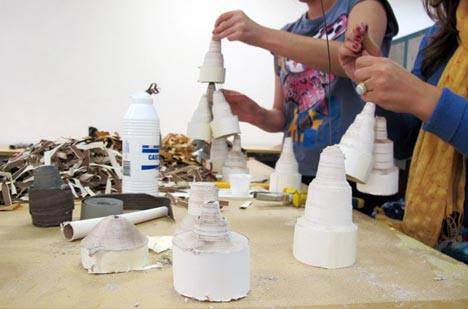
By Jennifer Hattam
From the organizers of a prestigious annual competition in Australia to Balinese craftspeople selling their wares on the street, the world is full of people designing a better world, a little bit at a time. Two Eur opean designers are meeting as many as they can on a globe-trotting tour of sustainable design that takes in high-profile building projects as well as "accidentally environmental" local practices — including one of which your mother might not not approve.
German-Dutch design couple Paula Raché and Aart van Bezooyen embarked on their "It's Not Easy Being Green" tour in March and have since visited Brazil, Argentina, Chile, New Zealand, Australia, Indonesia, Singapore, Thailand, and Vietnam, with at least four more stops to go on their tour of global sustainability in materials and design. (The essential un-sustainability of jetting around the world on such a tour is, of course, something I'd like to see them address in their writing about the trip.)
Recycling Paper Waste, A Bamboo School, And A Naturally Green Drink
During the trip, Raché and Bezooyen are both teaching and learning. They held a workshop in Brazil on developing new uses for paper waste left over from manufacturing processes, and lectured at a public university in Argentina about sustainability in materials and design. They've visited the studios of eco-friendly designers and the bamboo school in Indonesia made famous at a TED Talk last year. They also developed a taste for the Argentinean tradition of drinking maté, in part because of its "zero waste" appeal:
The art of drinking maté is a common social practice among people of all ages. Mate is about bringing your own dry leaves, a hollow gourd with metal straw, thermos with hot water, and sharing a single cup with your friends.
Germ-phobic moms (like mine) would probably pass on the shared-cup idea, but it does avoid the wasted containers littering countries with coffee-to-go cultures. "Unlike green-labeled foods, drinking maté is a phenomenon that doesn't wear the label of 'being green' but demonstrates how sustainability can be rooted in culture (probably without even realizing it)," Raché and Bezooyen wrote. Four months into their half-year journey, sometimes it apparently is easy being green.
Article courtesy of treehugger.com

